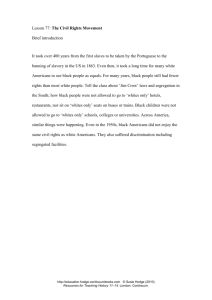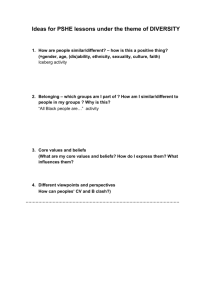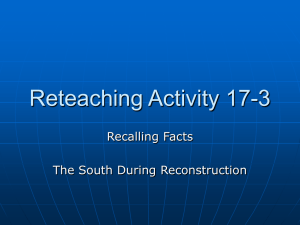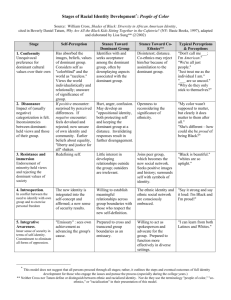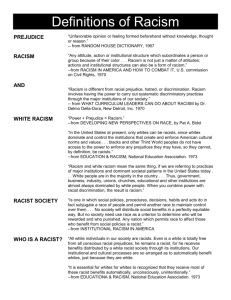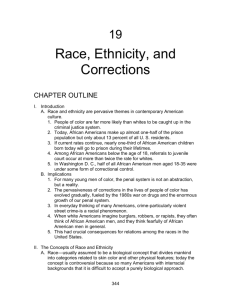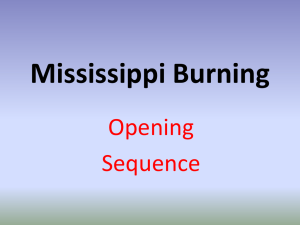What is Racism?
advertisement
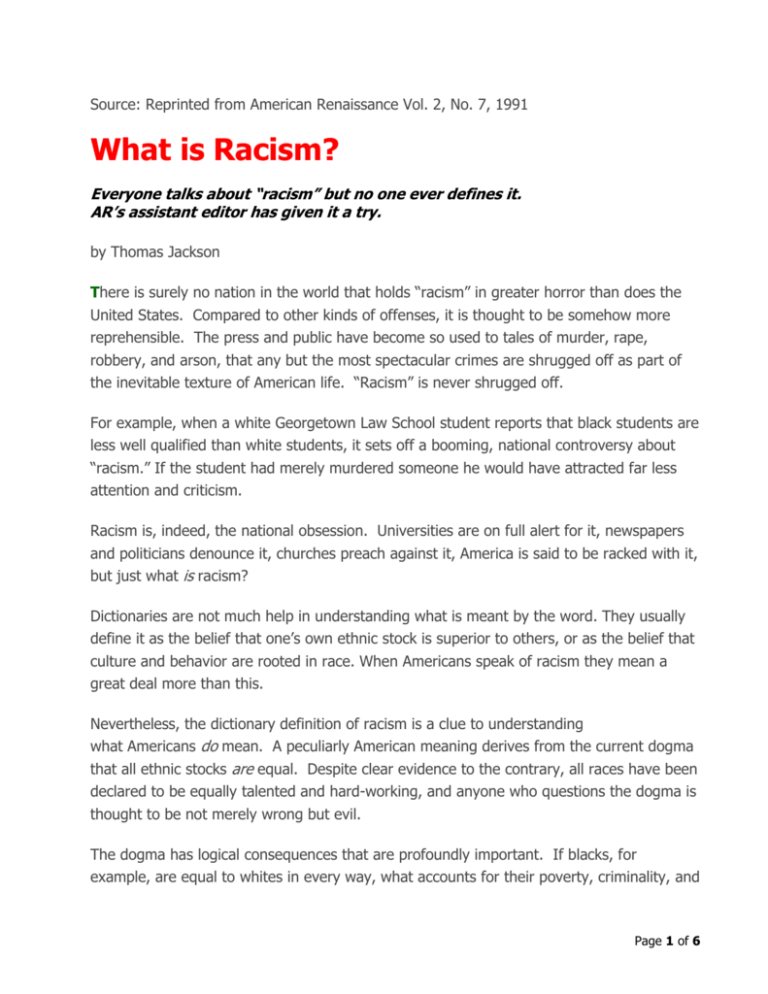
Source: Reprinted from American Renaissance Vol. 2, No. 7, 1991 What is Racism? Everyone talks about “racism” but no one ever defines it. AR’s assistant editor has given it a try. by Thomas Jackson There is surely no nation in the world that holds “racism” in greater horror than does the United States. Compared to other kinds of offenses, it is thought to be somehow more reprehensible. The press and public have become so used to tales of murder, rape, robbery, and arson, that any but the most spectacular crimes are shrugged off as part of the inevitable texture of American life. “Racism” is never shrugged off. For example, when a white Georgetown Law School student reports that black students are less well qualified than white students, it sets off a booming, national controversy about “racism.” If the student had merely murdered someone he would have attracted far less attention and criticism. Racism is, indeed, the national obsession. Universities are on full alert for it, newspapers and politicians denounce it, churches preach against it, America is said to be racked with it, but just what is racism? Dictionaries are not much help in understanding what is meant by the word. They usually define it as the belief that one’s own ethnic stock is superior to others, or as the belief that culture and behavior are rooted in race. When Americans speak of racism they mean a great deal more than this. Nevertheless, the dictionary definition of racism is a clue to understanding what Americans do mean. A peculiarly American meaning derives from the current dogma that all ethnic stocks are equal. Despite clear evidence to the contrary, all races have been declared to be equally talented and hard-working, and anyone who questions the dogma is thought to be not merely wrong but evil. The dogma has logical consequences that are profoundly important. If blacks, for example, are equal to whites in every way, what accounts for their poverty, criminality, and Page 1 of 6 dissipation? Since any theory of racial differences has been outlawed, the only possible explanation for black failure is white racism. And since blacks are markedly poor, crimeprone, and dissipated, America must be racked with a pervasive and horrible racism. Nothing else could be keeping them–the undisputed equals of whites–in such an abject state. All public discourse on race today is locked into this rigid logic. Any explanation for black failure that does not depend on white wickedness threatens to veer off into the forbidden territory of racial differences. Thus, even if today’s whites can find in their hearts no desire to oppress blacks, yesterday’s whites must have oppressed them. If whites do not consciously oppress blacks, they must oppress them unconsciously. If no obviously racist individuals can be identified, then institutions must be racist. Or, since blacks are failing so terribly in America, there simply must be millions of white people we do not know about, who are working day and night to keep blacks in misery. The dogma of racial equality leaves no room for an explanation of black failure that is not, in some fashion, an indictment of white people. The logical consequences of this are clear. Since we are required to believe that the only explanation for non-white failure is white racism, every time a non-white is poor, commits a crime, goes on welfare, or takes drugs, white society stands accused of yet another act of racism. All failure or misbehavior by non-whites is standing proof that white society is riddled with hatred and bigotry. For precisely so long as non-whites fail to succeed in life at exactly the same level as whites, whites will be, by definition, thwarting and oppressing them. This obligatory pattern of thinking leads to strange conclusions. First of all, racism is a sin that is thought to be committed almost exclusively by white people. Indeed, a black congressman from Chicago, Gus Savage, and Coleman Young, the black mayor of Detroit, have argued that only white people can be racist. Likewise, in 1987, the affirmative action officer of the State Insurance Fund of New York issued a company pamphlet in which she explained that all whites are racist and that only whites can be racist. How else could the plight of blacks be explained without flirting with the possiblity of racial inequality? Although some blacks and liberal whites concede that non-whites can, perhaps, be racist, they invariably add that non-whites have been forced into it as self-defense because of centuries of white oppression. What appears to be non-white racism is so understandable Page 2 of 6 and forgivable that it hardly deserves the name. Thus, whether or not an act is called racism depends on the race of the racist. What would surely be called racism when done by whites is thought to be normal when done by anyone else. The reverse is also true. Examples of this sort of double standard are so common, it is almost tedious to list them: When a white man kills a black man and uses the word “nigger” while doing so, there is an enormous media uproar and the nation beats its collective breast; when members of the black Yahweh cult carry out ritual murders of random whites, the media are silent (see AR of March, 1991). College campuses forbid pejorative statements about non-whites as “racist,” but ignore scurrilous attacks on whites. At election time, if 60 percent of the white voters vote for a white candidate, and 95 percent of the black voters vote for the black opponent, it is whites who are accused of racial bias. There are 107 “historically black” colleges, whose fundamental blackness must be preserved in the name of diversity, but all historically white colleges must be forcibly integrated in the name of . . . the same thing. To resist would be racist. “Black pride” is said to be a wonderful and worthy thing, but anything that could be construed as an expression of white pride is a form of hatred. It is perfectly natural for third-world immigrants to expect school instruction and driver’s tests in their own languages, whereas for native Americans to ask them to learn English is racist. Blatant anti-white prejudice, in the form of affirmative action, is now the law of the land. Anything remotely like affirmative action, if practiced in favor of whites, would be attacked as despicable favoritism. All across the country, black, Hispanic, and Asian clubs and caucuses are thought to be fine expressions of ethnic solidarity, but any club or association expressly for whites is by definition racist. The National Association for the Advancement of Colored People (NAACP) campaigns openly for black advantage but is a respected “civil rights” organization. The National Association for the Advancement of White People (NAAWP) campaigns merely for equal treatment of all races, but is said to be viciously racist. At a few college campuses, students opposed to affirmative action have set up student unions for whites, analogous to those for blacks, Hispanics, etc, and have been roundly condemned as racists. Recently, when the white students at Lowell High School in San Francisco found themselves to be a minority, they asked for a racially exclusive club like Page 3 of 6 the ones that non-whites have. They were turned down in horror. Indeed, in America today, any club not specifically formed to be a white enclave but whose members simply happen all to be white is branded as racist. Today, one of the favorite slogans that define the asymmetric quality of American racism is “celebration of diversity.” It has begun to dawn on a few people that “diversity” is always achieved at the expense of whites (and sometimes men), and never the other way around. No one proposes that Howard University be made more diverse by admitting whites, Hispanics, or Asians. No one ever suggests that National Hispanic University in San Jose (CA) would benefit from the diversity of having non-Hispanics on campus. No one suggests that the Black Congressional Caucus or the executive ranks of the NAACP or the Mexican-American Legal Defense and Education Fund suffer from a lack of diversity. Somehow, it is perfectly legitimate for them to celebrate homogeneity. And yet any all-white group–a company, a town, a school, a club, a neighborhood–is thought to suffer from a crippling lack of diversity that must be remedied as quickly as possible. Only when whites have been reduced to a minority has “diversity” been achieved. Let us put it bluntly: To “celebrate” or “embrace” diversity, as we are so often asked to do, is no different from deploring an excess of whites. In fact, the entire nation is thought to suffer from an excess of whites. Our current immigration policies are structured so that approximately 90 percent of our annual 800,000 legal immigrants are non-white. The several million illegal immigrants that enter the country every year are virtually all nonwhite. It would be racist not to be grateful for this laudable contribution to “diversity.” It is, of course, only white nations that are called upon to practice this kind of “diversity.” It is almost comical to imagine a nation of any other race countenancing blatant dispossession of this kind. What if the United States were pouring its poorest, least educated citizens across the border into Mexico? Could anyone be fooled into thinking that Mexico was being “culturally enriched?” What if the state of Chihuahua were losing its majority population to poor whites who demanded that schools be taught in English, who insisted on celebrating the Fourth of July, who demanded the right to vote even if they weren’t citizens, who clamored for “affirmative action” in jobs and schooling? Would Mexico–or any other non-white nation–tolerate this kind of cultural and demographic depredation? Of course not. Yet white Americans are supposed to look upon Page 4 of 6 the flood of Hispanics and Asians entering their country as a priceless cultural gift. They are supposed to “celebrate” their own loss of influence, their own dwindling numbers, their own dispossession, for to do otherwise would be hopelessly racist. There is another curious asymmetry about American racism. When non-whites advance their own racial purposes, no one ever accuses them of “hating” any other group. Blacks can join “civil rights” groups and Hispanics can be activists without fear of being branded as bigots and hate mongers. They can agitate openly for racial preferences that can come only at the expense of whites. They can demand preferential treatment of all kinds without anyone ever suggesting that they are “anti-white.” Whites, on the other hand, need only express their opposition to affirmative action to be called haters. They need only object to racial policies that are clearly prejudicial to themselves to be called racists. Should they actually go so far as to say that they prefer the company of their own kind, that they wish to be left alone to enjoy the fruits of their European heritage, they are irredeemably wicked and hateful. Here, then is the final, baffling inconsistency about American race relations. All non-whites are allowed to prefer the company of their own kind, to think of themselves as groups with interests distinct from those of the whole, and to work openly for group advantage. None of this is thought to be racist. At the same time,whites must also champion the racial interests of non-whites. They must sacrifice their own future on the altar of “diversity” and cooperate in their own dispossession. They are to encourage, even to subsidize, the displacement of a European people and culture by alien peoples and cultures. To put it in the simplest possible terms, white people are cheerfully to slaughter their own society, to commit racial and cultural suicide. To refuse to do so would be racism. Of course, the entire non-white enterprise in the United States is perfectly natural and healthy. Nothing could be more natural than to love one’s people and to hope that it should flourish. Philippinos and El Salvadorans are doubtless astonished to discover that simply by setting foot in the United States they are entitled to affirmative-action preferences over native-born whites, but can they be blamed for accepting them? Is it surprising that they should want their languages, their cultures, their brothers and sisters to take possession and put their mark indelibly on the land? If the once-great people of a once-great nation is bent upon self-destruction and is prepared to hand over land and Page 5 of 6 power to whomever shows up and asks for it, why should Mexicans and Cambodians complain? No, it is the white enterprise in the United States that is unnatural, unhealthy, and without historical precedent. Whites have let themselves be convinced that it is racist merely to object to dispossession, much less to work for their own interests. Never in the history of the world has a dominant people thrown open the gates to strangers, and poured out its wealth to aliens. Never before has a people been fooled into thinking that there was virtue or nobility in surrendering its heritage, and giving away to others its place in history. Of all the races in America, only whites have been tricked into thinking that a preference for one’s own kind is racism. Only whites are ever told that a love for their own people is somehow “hatred” of others. All healthy people prefer the company of their own kind, and it has nothing to do with hatred. All men love their families more than they love their neighbors, but this does not mean they hate their neighbors. Whites who love their racial family need bear no ill will towards non-whites. They wish only to be left alone to participate in the unfolding of their racial and cultural destinies. What whites in America are being asked to do is therefore utterly unnatural. They are being asked to devote themselves to the interests of other races and to ignore the interests of their own. This is like asking a man to forsake his own children and love the children of his neighbors, since to do otherwise would be “racist.” What, then, is “racism?” It is considerably more than any dictionary is likely to say. It is any opposition by whites to official policies of racial preference for non-whites. It is any preference by whites for their own people and culture. It is any resistance by whites to the idea of becoming a minority people. It is any unwillingness to be pushed aside. It is, in short, any of the normal aspirations of peoplehood that have defined nations since the beginning of history–but only so long as the aspirations are those of whites. Page 6 of 6
